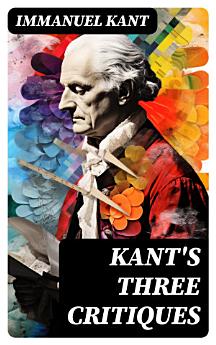Kant's Three Critiques: The Critique of Pure Reason, The Critique of Practical Reason & The Critique of Judgment
Immanuel Kant
Dec 2023 · DigiCat
Ebook
942
Pages
family_home
Eligible
info
reportRatings and reviews aren’t verified Learn More
About this ebook
In "Kant's Three Critiques," Immanuel Kant presents a foundational exploration of human knowledge, ethics, and aesthetics through his seminal texts: the "Critique of Pure Reason," "Critique of Practical Reason," and "Critique of Judgment." Each critique serves a unique purpose; the first interrogates the limits and scope of human understanding, the second articulates the principles of moral philosophy, and the third bridges the realms of beauty and morality. Kant's prose, renowned for its complexity and rigor, demands thoughtful engagement, situating his work within the Enlightenment context that champions reason, autonomy, and scientific inquiry. Kant, a pivotal figure in modern philosophy, published these critiques in the late 18th century, emerging from a milieu ripe for intellectual revolution. His experiences in the rapidly changing landscape of Prussia, coupled with exposure to rationalist and empiricist thought, catalyzed his inquiries into the structures of human cognition, ethical imperatives, and aesthetic appreciation. His rich background in mathematics and natural sciences also influenced his systematic approach to philosophy. Readers seeking a profound engagement with the questions of existence, morality, and perception will find "Kant's Three Critiques" indispensable. Kant's work challenges us to reconsider not just our understanding of knowledge, but also the ethical frameworks and aesthetic values that shape our lives, making it a vital resource for philosophers and general readers alike.
About the author
Immanuel Kant (1724–1804) stands as a central figure in modern philosophy, who synthesized early modern rationalism and empiricism, set the terms for much of nineteenth and twentieth-century philosophy, and continues to exercise a significant influence today in metaphysics, epistemology, ethics, political philosophy, aesthetics, and other fields. His most significant contributions lie in his critical philosophy, particularly the 'Critique of Pure Reason' (1781), 'Critique of Practical Reason' (1788), and 'Critique of Judgment' (1790), collectively known as 'Kant's Three Critiques'. In these seminal works, Kant sought to establish the limits and scope of human understanding, the foundations of human morality, and the aesthetics of judgment. He is often associated with the doctrine of transcendental idealism, which posits that our experience of reality is shaped by the mind's innate structures. Through his moral philosophy, Kant developed the concept of the categorical imperative, a principle suggesting that one should only act according to that maxim whereby you can, at the same time, will that it should become a universal law. His work has been profoundly analytical and critical, setting the stage for the development of various philosophical movements, such as German Idealism and Phenomenology. Kant's influence permeates a range of philosophical discourses and his ideas continue to be a point of reference in debates about deontological ethics, the theory of knowledge, and aesthetics among others.
Rate this ebook
Tell us what you think.
Reading information
Smartphones and tablets
Install the Google Play Books app for Android and iPad/iPhone. It syncs automatically with your account and allows you to read online or offline wherever you are.
Laptops and computers
You can listen to audiobooks purchased on Google Play using your computer's web browser.
eReaders and other devices
To read on e-ink devices like Kobo eReaders, you'll need to download a file and transfer it to your device. Follow the detailed Help Center instructions to transfer the files to supported eReaders.








